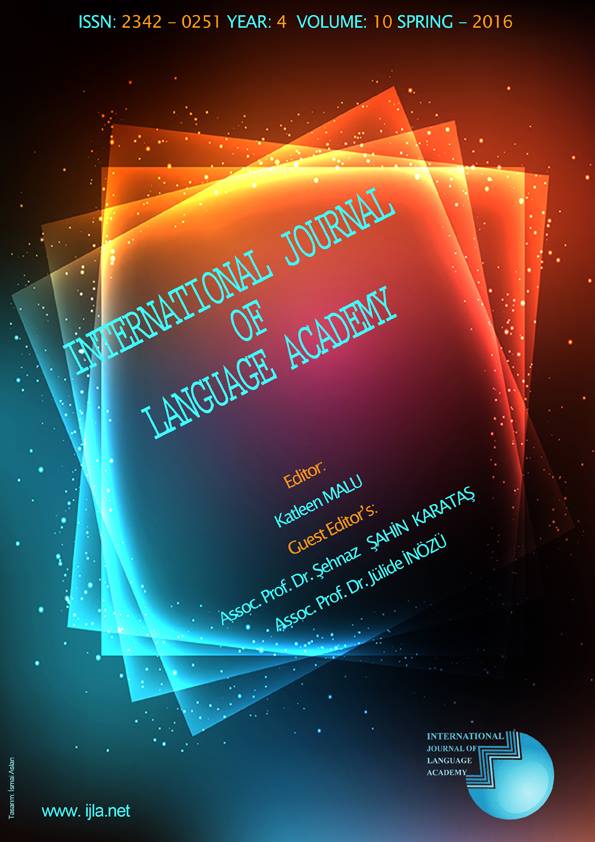TÜRKİYE’DEKİ İNGİLİZCE ÖĞRETMENLİĞİ ÖĞRETMEN YETİŞTİRME PROGRAMLARININ İNGİLİZCE’Yİ YABANCI DİL OLARAK ÖĞRETECEK ÖĞRETMEN ADAYLARI VE EĞİTMENLERİNİN BAKIŞ AÇISINDAN DEĞERLENDİRİLMESİ
Author :
Abstract
Öğretmen yetiştirme programlarının sistematik bir değerlendirmeye ihtiyaç duyması meselesi birçok araştırmacı tarafından vurgulanmaktadır. Mevcut çalışma İngilizce’yi yabancı dil olarak öğretecek öğretmen adaylarının ve eğitmenlerinin Türkiye’deki İngilizce öğretmenliği programlarına yönelik görüşlerini Peacock’ın (2009) değerlendirme modeli aracılığıyla araştırmayı amaçlamaktadır. Bu çalışma 4. sınıfta okuyan İngilizce öğretmenliği bölümü öğrencileri ve eğitmenlerinden anket ve röportajlar aracılığıyla toplanan verilere dayanmaktadır. Çalışma sonuçları aday İngilizce öğretmenlerinin katıldıkları İngilizce öğretmenliği programından genel olarak memnun olduklarını göstermiştir. Bununla birlikte, İngilizce öğretmenliği programlarının bazı eksikliklere sahip olduğu belirtilmiş ve bu eksikliklerin giderilmesi için dikkate alınabilecek bazı önerilerde bulunulmuştur.
Keywords
Abstract
The fact that teacher education programs need a systematic evaluation has been emphasised by many researchers. The present study aims to investigate the pre-service EFL teachers’ views on EFL teacher education programs they attend in Turkey and their instructors by means of Peacock’s (2009) recent evaluation model. This study is based on the data collected from fourth grade ELT department students and their instructors via questionnaires and interviews. The results obtained through data collection tools revealed that the pre-service EFL teachers had a strong agreement in general with the program they were attending. However, the programs were stated to have some shortcomings and some suggestions were put forward to be taken into consideration to overcome those shortcomings.
Keywords
- Brown, J.& Yamashita, S. (1995). English language entrance examinations at Japanese universities: What do we know about them? JALT Journal, 17(1), 7-30.
- Burns, A. & Richard, J. C. (2009). Second language teacher education. The USA: Cambridge University Press.
- Cosgun-Ogeyik, M. (2009). Evaluation of English language teaching education curriculum by student teachers. Insan ve Toplum, 9(1), 42-57.
- Coskun, A. & Daloglu, A. (2010). Evaluating an English language teacher education program through Peacock’s model. Australian Journal of Teacher Education, 35(6), 24-42.
- Day, R. (1991). Models and the knowledge base of second language teacher education. East Lansing, MI: National Center for Research on Teacher Learning.
- Erozan, F. (2005). Evaluating the language improvement courses in the undergraduate ELT curriculum at Eastern Mediterranean University: A case study. Unpublished doctoraldissertation, Middle East Technical University, Ankara, Turkey.
- Guven, M., Kurum, D. & Saglam, M. (2012). Evaluation of the distance education pre- service teachers’ opinions about teaching practice course: Case of İzmir city. Turkish Online Journal of Distance Education, 13(1), 112-127.
- Hismanoglu, S. (2012). Prospective EFL teachers’ views on English language teacher training program. Journal of Research in Education and Teaching, 1(2), 330-341.
- Kasanda, C.D (1995). Teaching practice at the University of Namibia: Views from student teachers. Zimbabwe Journal of Educational Research, 7, 57-68.
- Minott, M. A. & Young, A. E. (2009). The benefits of employing a hybrid evaluation approach, enacted through evaluation survey and reflective journaling in teacher education in the Cayman Islands. Australian Journal of Teacher Education, 34(4), 16-26.
- Peacock, M. (2009). The evaluation of foreign-language-teacher education programmes. Language Teaching Research, 13(3), 259-78.
- Rea-Dickins, P. & Germaine, K.P. (1998). The price of everything and the value of nothing: trends in language programme evaluation. In Rea-Dickins, P. and Germaine, K.P. (Eds.), Managing evaluation and innovation in languageteaching: Building bridges (pp. 3–19). London: Longman.
- Reid, J.M. (1996). Let’s put the ‘T’ back in TESL/TEFL programs. TESOL Matters, 5(6), 3.
- Richards, J. C. (1990). The dilemma of teacher education in second language teaching. In Richards, J.C. & Nunan, D. (Eds.), Second language teacher education (pp. 3–15). Cambridge: Cambridge University Press.
- Salihoglu, U. M. (2012). Pre-service teachers’ and their instructors’ beliefs on the effectiveness of an english language teacher education program. Procedia - Social and Behavioral Sciences, 46, 3440-3444.
- Salli-Copur, D. S. (2008). Teacher effectiveness in initial years of service: A case study on the graduates of METU language education program. Unpublished doctoral dissertation, Middle East Technical University, Ankara, Turkey.
- Seferoglu, G. (2006). Teacher candidates' reflections on some components of a pre‐service English teacher education programme in Turkey. Journal of Education for Teaching: International research and pedagogy, 32(4), 369-378.
- Tang, C. (1997). On the Power and Status of Nonnative ESL Teachers. TESOL Quarterly, 31(3), 577-580.
- Thomas. A. M. & Loadman, W. E. (2001). Evaluating teacher education programs using a national survey. Journal of Educational Research, 94(4), 195-206.
- Ur, P. (1992). Teacher learning. ELT Journal, 46, 56-61.
- Wallace, M. J. (1991). Training foreign language teachers. Cambridge: Cambridge University Press.
- Weir, C. & Roberts, J. (1994). Evaluation in ELT. Oxford: Blackwell.
- Yavuz, A. & Topkaya, E. Z. (2013). Teacher educators’ evaluation of the English language teaching program: A Turkish case. Novitas-ROYAL, 7(1), 64-83.
